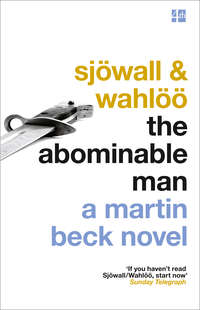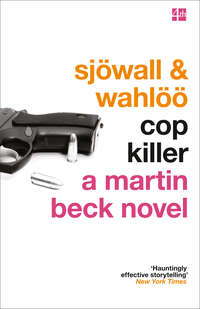
Полная версия
The Laughing Policeman
‘Yes, one,’ Martin Beck said. ‘Stenström. What was he doing on that bus?’
Nobody answered.
An hour later Hammar put exactly the same question to Martin Beck.
Hammar had summoned the special investigation group that from now on was to work entirely on the bus murders. The group consisted of seventeen experienced CID men, with Hammar in charge. Martin Beck and Kollberg also led the investigation.
All available facts had been studied, the situation had been analysed and assignments allotted. When the briefing was over and all except Martin Beck and Kollberg had left the room, Hammar said, ‘What was Stenström doing on that bus?’
‘Don't know,’ Martin Beck replied.
‘And nobody seems to know what he was working on of late. Do either of you know?’
Kollberg threw up his hands and shrugged.
‘Haven't the vaguest idea. Over and above daily routine, that is. Presumably nothing.’
‘We haven't had so much recently,’ Martin Beck said. ‘So he has had quite a bit of time off. He had put in an enormous amount of overtime before, so it was only fair.’
Hammar drummed his fingers against the edge of the desk and wrinkled his brow in thought. Then he said, ‘Who was it that informed his fiancée?’
‘Melander,’ said Kollberg.
‘I think someone ought to have a talk with her as soon as possible,’ Hammar said. ‘She must at all events know what he was up to.’
He paused, then added, ‘Unless he …’
He fell silent.
‘What?’ Martin Beck asked.
‘Unless he was going with that nurse on the bus, you mean,’ Kollberg said.
Hammar said nothing.
‘Or was out on another similar errand,’ Kollberg said.
Hammar nodded.
‘Find out,’ he said.
10
Outside police headquarters on Kungsholmsgatan stood two people who definitely wished they had been somewhere else. They were dressed in police caps and leather jackets with gilded buttons, they had shoulder belts diagonally across their chests and carried pistols and truncheons at their waists. Their names were Kristiansson and Kvant.
A well-dressed, elderly woman came up to them and asked, ‘Excuse me, but how do I get to Hjärnegatan?’
‘I don't know, madam,’ Kvant said. ‘Ask a policeman. There's one standing over there.’
The woman gaped at him.
‘We're strangers here ourselves,’ Kristiansson put in quickly, by way of explanation.
The woman was still staring after them as they mounted the steps.
‘What do you think they want us for?’ Kristiansson asked anxiously.
‘To give evidence, of course,’ Kvant replied. ‘We made the discovery, didn't we?’
‘Yes,’ Kristiansson said. ‘We did, but –’
‘No “buts,” now, Kalle. Into the lift with you.’
On the third floor they met Kollberg. He nodded to them, gloomily and absently. Then he opened a door and said, ‘Gunvald, those two guys from Solna are here now.’
‘Tell them to wait,’ said a voice from inside the office.
‘Wait,’ Kollberg said, and disappeared.
When they had waited for twenty minutes Kvant shook himself and said, ‘What the hell's the idea. We're supposed to be off duty, and I've promised Siv to mind the kids while she goes to the doctor.’
‘So you said,’ Kristiansson said dejectedly.
‘She says she feels something funny in her cu—’
‘Yeah, you said that too,’ Kristiansson murmured.
‘Now she'll probably be in a terrible temper again,’ Kvant said. ‘I can't make the woman out these days. And she's starting to look such a fright. Has Kerstin also got broad in the beam like that?’
Kristiansson didn't answer.
Kerstin was his wife and he disliked discussing her.
Kvant didn't seem to care.
Five minutes later Gunvald Larsson opened the door and said curtly, ‘Come in.’
They went in and sat down. Gunvald Larsson eyed them critically.
‘Sit down, by all means.’
‘We have already,’ Kristiansson said fatuously.
Kvant silenced him with an impatient gesture. He began to scent trouble.
Gunvald Larsson stood silent for a moment. Then he placed himself behind the desk, sighed heavily and said, ‘How long have you both been on the force?’
‘Eight years,’ said Kvant.
Gunvald Larsson picked up a sheet of paper from the desk and studied it.
‘Can you read?’ he asked.
‘Oh yes,’ said Kristiansson, before Kvant could stop him.
‘Read, then.’
Gunvald Larsson pushed the sheet across the desk.
‘Do you understand what's written there? Or do I have to explain it?’
Kristiansson shook his head.
‘I'll explain gladly,’ Gunvald Larsson said. ‘That is a preliminary report from the investigation at the scene of the crime. It shows that two individuals with size eleven shoes have left behind them about one hundred footprints all over that damn bus, both on the upper and lower deck. Who do you think these two individuals can be?’
No answer.
‘To explain further, I can add that I spoke to an expert at the lab not long ago, and he said that the scene of the crime looked as if a herd of hippopotamuses had been trotting about there for hours. This expert considers it incredible that a herd of human beings, consisting of only two individuals, should be able to wipe out almost every trace so completely and in such a short time.’
Kvant began to lose his temper, and stared stonily at the man behind the desk.
‘Now it so happens that hippopotamuses and other animals don't usually go about armed,’ Gunvald Larsson went on in honeyed tones. ‘Nevertheless, someone fired a shot inside the bus with a 7.65 mm Walther-to be exact, up through the front stairs. The bullet ricocheted against the roof and was found embedded in the padding of one of the seats on the upper deck. Who do you think can have fired that shot?’
‘We did,’ Kristiansson said. ‘That's to say, I did.’
‘Oh, really? And what were you firing at?’
Kristiansson scratched his neck unhappily.
‘Nothing,’ he said.
‘It was a warning shot,’ Kvant said.
‘Intended for whom?’
‘We thought the murderer might still be in the bus and was hiding on the top deck,’ Kristiansson said.
‘And was he?’
‘No,’ said Kvant.
‘How do you know? What did you do after that cannonade?’
‘We went up and had a look,’ Kristiansson said.
‘There was nobody there,’ said Kvant.
Gunvald Larsson glared at them for at least half a minute. Then he slammed the flat of his hand on the desk and roared, ‘So both of you went up! How the hell could you be so damn stupid?’
‘We each went up a different way,’ Kvant said defensively. ‘I went up the back stairs and Kalle took the front stairs.’
‘So that whoever was up there couldn't escape,’ said Kristiansson, trying to make things better.
‘But Jesus Christ there wasn't anyone up there! All you managed to do was to ruin every single footprint there was in the whole damn bus! To say nothing of outside! And why did you go tramping about among the bodies? Was it to make even more of a gory mess inside there?’
‘To see if anyone was still alive,’ Kristiansson said.
He turned pale and swallowed.
‘Now don't start throwing up again, Kalle,’ Kvant said reprovingly.
The door opened and Martin Beck came in. Kristiansson stood up at once, and after a moment Kvant followed his example.
Martin Beck nodded to them and looked inquiringly at Gunvald Larsson.
‘Are you the one who is shouting? It doesn't help much, bawling out these boys.’
‘Yes it does,’ Gunvald Larsson retorted. ‘It's constructive.’
‘Constructive?’
‘Exactly. These two idiots …’
He broke off and reconsidered his vocabulary.
‘These two colleagues are the only witnesses we have. Listen now, you two! What time did you arrive on the scene?’
‘Thirteen minutes past eleven,’ Kvant said. ‘I took the time on my chronograph.’
‘And I sat in exactly the same spot where I'm sitting now,’ Gunvald Larsson said. ‘I received the call at eighteen minutes past eleven. If we allow a wide margin and say that you fumbled with the radio for half a minute and that it took fifteen seconds for the Radio Central to contact me, that still leaves more than four minutes. What were you doing during that time?’
‘Well …’ said Kvant.
‘You ran about like poisoned rats, trampling in blood and brains and moving bodies and doing God knows what. For four minutes.’
‘I really can't see what's constructive –’ Martin Beck began, but Gunvald Larsson cut him off.
‘Wait a minute. Apart from the fact that these nitwits spent four minutes ruining the scene of the crime, they did get there at thirteen minutes past eleven. And they didn't go of their own accord but were told by the man who first discovered the bus. Is that right?’
‘Yes,’ said Kvant.
‘The old boy with the dog,’ said Kristiansson.
‘Exactly. They were notifed by a person whose name they didn't even bother to find out and whom we probably would never have identified if he hadn't been nice enough to come here today. When did you first catch sight of this man with the dog?’
‘Well …’ said Kvant.
‘About two minutes before we got to the bus,’ said Kristiansson, looking down at his boots.
‘Exactly. Because according to his statement they wasted at least a minute sitting in the car and shouting at him rudely. About dogs and things. Am I right?’
‘Yes,’ mumbled Kristiansson.
‘When you received the information the time was therefore approximately ten or eleven minutes past. How far from the bus was this man when he stopped you?’
‘About three hundred yards,’ said Kvant.
‘That's a fact, that's a fact,’ said Gunvald Larsson. ‘And since this man was seventy years old and also had a sick dachshund to drag along …’
‘Sick?’ said Kvant in surprise.
‘Exactly,’ Gunvald Larsson replied. ‘The damn dog had a slipped disc and was almost lame in the hind legs.’
‘I'm at last beginning to see what you mean,’ said Martin Beck.
‘Mm-m. I had the man do a trial run on the same stretch today. Dog and all. Made him do it three times, then the dog gave up.’
‘But that's cruelty to animals,’ Kvant said indignantly.
Martin Beck cast a surprised and interested glance at him.
‘At any rate the pair of them couldn't cover the distance in under three minutes, however hard they tried. Which means that the man must have caught sight of the stationary bus at seven minutes past eleven at the latest. And we know almost for sure that the massacre took place between three and four minutes earlier.’
‘How do you know that?’ Kristiansson and Kvant said in chorus.
‘None of your business,’ Gunvald Larsson retorted.
‘Inspector Strenström's watch,’ said Martin Beck. ‘One of the bullets passed straight through his chest and landed up in his right wrist. It broke off the stem of his wrist watch, an Omega Speedmaster, which according to the expert made the watch stop at the same instant. The hands showed three minutes and thirty-seven seconds past eleven.’
Gunvald Larsson glowered at him.
‘We knew Inspector Stenström, and he was meticulous about time,’ Martin Beck said sadly. ‘He was what watchmakers sometimes call a second hunter. That is, his watch always showed the exact time. Go on, Gunvald.’
‘This man with the dog came walking along Norrbackagatan from the direction of Karlbergsvägen. He was in fact overtaken by the bus just where the street begins. It took him about five minutes to trudge down Norrbackagatan. The bus did the same stretch in about forty-five seconds. He met nobody on the way. When he got to the corner he saw the bus standing on the other side of the street.’
‘So what,’ said Kvant.
‘Shut up,’ said Gunvald Larsson.
Kvant made a violent movement and opened his mouth, but glanced at Martin Beck and shut it again.
‘He did not see that the windows had been shattered, which, by the way, these two wonderboys didn't notice either when they eventually managed to crawl along. But he did see that the front door was open. He thought there had been an accident and hurried to get help. Calculating, quite correctly, that it would be quicker for him to reach the last bus stop than to go back up the hill along Norrbackagatan, he started off along Norra Stationsgatan in a south-westerly direction.’
‘Why?’ said Martin Beck.
‘Because he thought there'd be another bus waiting at the end of the line. As it happened, there wasn't. Instead, unfortunately, he met a police patrol car.’
Gunvald Larsson cast an annihilating china-blue glance at Kristiansson and Kvant.
‘A patrol car from Solna that came creeping out of its district like something that comes out when you lift up a rock. Well, how long had you been skulking with the engine idling and the front wheels on the city limits?’
‘Three minutes,’ said Kvant.
‘Four or five, more like it,’ said Kristiansson.
Kvant gave him a withering look.
‘And did you see anyone coming that way?’
‘No,’ said Kristiansson. ‘Not until that man with the dog.’
‘Which proves that the murderer cannot have made off to the south-west along Norra Stationsgatan, nor south up Norrbackagatan. If we take it that he did not hop over into the freight depot, there's only one possibility left. Norra Stationsgatan in the opposite direction.’
‘How do … we know that he didn't head into the station yard?’ Kristiansson asked.
‘Because that was the only spot where you two hadn't trampled down everything in sight. You forgot to climb over the fence and mess around there, too.’
‘OK, Gunvald, you've made your point, now,’ Martin Beck said. ‘Good. But as usual it took a hell of a time to get down to brass tacks.’
This remark encouraged Kristiansson and Kvant to exchange a look of relief and secret understanding. But Gunvald Larsson cracked out, ‘If you two had had any sense in your thick skulls you would have got into the car, caught the murderer and nabbed him.’
‘Or have been butchered ourselves,’ Kristiansson retorted misanthropically.
‘When I grab that guy I'm damn well going to shove you two in front of me,’ Gunvald Larsson said savagely.
Kvant stole a glance at the wall clock and said, ‘Can we go now? My wife –’
‘Yes,’ said Gunvald Larsson. ‘You can go to hell!’
Avoiding Martin Beck's reproachful look, he said, ‘Why didn't they think?’
‘Some people need longer than others to develop their train of thought,’ Martin Beck said amiably. ‘Not only detectives.’
11
‘Now we must think,’ Gunvald Larsson said briskly, banging the door. ‘There's a briefing with Hammar at three o'clock sharp. In ten minutes.’
Martin Beck, sitting with the telephone receiver to his ear, threw him an irritated glance, and Kollberg looked up from his papers and muttered gloomily, ‘As if we didn't know. Try thinking yourself on an empty stomach and see how easy it is.’
Having to go without a meal was one of the few things that could put Kollberg in a bad mood. By this time he had gone without at least three meals and was therefore particularly glum. Moreover, he thought he could tell from Gunvald Larsson's satisfied expression that the latter had just been out and had something to eat, and the thought didn't make him any happier.
‘Where have you been?’ he asked suspiciously.
Gunvald Larsson didn't answer. Kollberg followed him with his eyes as he went over and sat down behind his desk.
Martin Beck put down the phone.
‘What's biting you?’ he said.
Then he got up, took his notes and went over to Kollberg.
‘It was from the lab,’ he said. ‘They've counted sixty-eight fired cartridges.’
‘What calibre?’ Kollberg asked.
‘As we thought. Nine millimetres. Nothing to say that sixty-seven of them didn't come from the same weapon.’
‘And the sixty-eighth?’
‘Walther 7.65.’
‘The shot fired at the roof by that Kristiansson,’ Kollberg declared.
‘Yes.’
‘It means there was probably only one madman after all,’ Gunvald Larsson said.
‘Yes,’ said Martin Beck.
Going over to the sketch, he drew an X inside the widest of the middle doors.
‘Yes,’ Kollberg said. ‘That's where he must have stood.’
‘Which would explain …’
‘What?’ Gunvald Larsson asked.
Martin Beck didn't answer.
‘What were you going to say?’ Kollberg asked. ‘Which would explain …?’
‘Why Stenström didn't have time to shoot,’ Martin Beck said.
The others looked at him wonderingly.
‘Hungh-h,’ said Gunvald Larsson.
‘Yes, yes, you're right, both of you,’ Martin Beck said doubtfully and massaged the root of his nose between the thumb and forefinger of his right hand.
Hammar flung open the door and entered the room, followed by Ek and a man from the office of the public prosecutor.
‘Reconstruction,’ he said abruptly. ‘Stop all telephone calls. Are you ready?’
Martin Beck looked at him mournfully. It had been Stenström's habit to enter the room in exactly the same way, unexpectedly and without knocking. Almost always. It had been extremely irritating.
‘What have you got there?’ Gunvald Larsson asked. ‘The evening papers?’
‘Yes,’ Hammar replied. ‘Very encouraging.’
He held the papers up and gave them a hostile glare. The headlines were big and black but the text contained very little information.
‘I quote,’ Hammar said. ‘“‘This is the crime of the century,' says tough CID man Gunvald Larsson of the Stockholm homicide squad, and goes on: ‘It was the most ghastly sight I've ever seen in my life’.”’ Two exclamation marks.’
Gunvald Larsson heaved himself back in the chair and frowned.
‘You're in good company,’ said Hammar. ‘The minister of justice has also excelled himself. “The tidal wave of lawlessness and the mentality of violence must be stopped. The police have drawn on all resources of men and materials in order to apprehend the culprit without delay.”’
He looked around him and said, ‘So these are the resources.’
Martin Beck blew his nose.
‘“The direct investigation force already comprises more than a hundred of the country's most skilled criminal experts,”’ Hammar went on. ‘“The biggest squad ever known in this country's history of crime.”’
Kollberg sighed and scratched his head.
‘Politicians,’ Hammar mumbled to himself.
Tossing the newspapers on to the desk, he said, ‘Where's Melander?’
‘Talking to the psychologists,’ Kollberg said.
‘And Rönn?’
‘At the hospital.’
‘Any news from there yet?’
Martin Beck shook his head.
‘They're still operating,’ he said.
‘Well,’ Hammar said. ‘The reconstruction.’
Kollberg looked through his papers.
‘The bus left Bellmansro about ten o'clock,’ he said.
‘About?’
‘Yes. The whole timetable had been thrown off by the commotion on Strandvägen. The buses were stuck in traffic jams or police cordons, and as there were already big delays the drivers had been told to ignore the departure times and turn straight round at the last stops.’
‘By radio?’
‘Yes. This instruction had already been sent out to the drivers on route 47 by shortly after nine o'clock. On Stockholm Transport's own wavelength.’
‘Go on.’
‘We assumed that there are people who rode part of the way on the bus on this particular run. But so far we haven't traced any such witnesses.’
‘They'll turn up,’ said Hammar.
He pointed to the newspapers and added, ‘After this.’
‘Stenström's watch had stopped at eleven, three and thirty-seven,’ Kollberg went on in a monotone. ‘There is reason to presume that the shots were fired at precisely that time.’
‘The first or the last?’ Hammar asked.
‘The first,’ Martin Beck said.
Turning to the sketch on the wall, he put his right forefinger on the X he had just drawn.
‘We assume that the gunman stood just here,’ he said. ‘In the open space by the exit doors.’
‘On what do you base that assumption?’
‘The trajectories. The position of the fired cartridges in relation to the bodies.’
‘Right. Go on.’
‘We also assume that the murderer fired three bursts. The first forward, from left to right, thereby shooting all those sitting in the front of the bus-marked here on the sketch as numbers one, two, three, eight and nine. Number one stands for the driver and number two for Stenström.’
‘And then?’
‘Then he turned around, probably to the right, and fired the next burst at the four individuals at the rear of the bus, still from left to right, killing numbers five, six and seven. And wounding number four-Schwerin, that is. Schwerin was lying on his back at the rear of the aisle. We take this to mean that he had been sitting on the longitudinal seat on the left side of the bus and that he had time to stand up. He would therefore have been hit last.’
‘And the third burst?’
‘Was fired forward,’ Martin Beck said. ‘This time from right to left.’
‘And the weapon must be a submachine gun?’
‘Yes,’ Kollberg replied. ‘In all probability. If it's the ordinary army type –’
‘One moment,’ Hammar interrupted. ‘How long should this have taken? To shoot forward, swing right around, shoot backward, point the weapon forward again and empty the magazine?’
‘As we still don't know what kind of weapon he used –’ Kollberg began, but Gunvald Larsson cut him off.
‘About ten seconds.’
‘How did he get out of the bus?’ Hammar asked.
Martin Beck nodded to Ek and said, ‘Your department.’
Ek passed his fingers through his silvery hair, cleared his throat and said, ‘The door that was open was the rear entrance door. In all likelihood the murderer left the bus that way. In order to open it he must first move straight forward along the aisle to the driver's seat, then stretch his arm over or past the driver and push a switch.’
He took out his glasses, polished them with his handkerchief and went over to the wall.
‘I've had two instruction sketches blown up here,’ he said. ‘One showing the instrument panel in its entirety, the other showing the actual lever for the front doors. On the first sketch the switch for the door circuits is marked with number 15 and the door lever with number 18. The lever is therefore to the left of the wheel, in front of and obliquely below the side window. The lever itself, as you see from the second sketch, has five different positions.’
‘Who could make head or tail out of all this?’ Gunvald Larsson said.
‘In the horizontal position, or position one, both doors are shut,’ Ek went on unperturbed. ‘In position two, one step upward, the rear entrance door is opened, in position three, two steps upward, both doors are opened. The lever also has two positions downward-numbers four and five. In the first of these, the front entrance door is opened, in the second, both doors are opened.’
Конец ознакомительного фрагмента.
Текст предоставлен ООО «ЛитРес».
Прочитайте эту книгу целиком, купив полную легальную версию на ЛитРес.
Безопасно оплатить книгу можно банковской картой Visa, MasterCard, Maestro, со счета мобильного телефона, с платежного терминала, в салоне МТС или Связной, через PayPal, WebMoney, Яндекс.Деньги, QIWI Кошелек, бонусными картами или другим удобным Вам способом.








